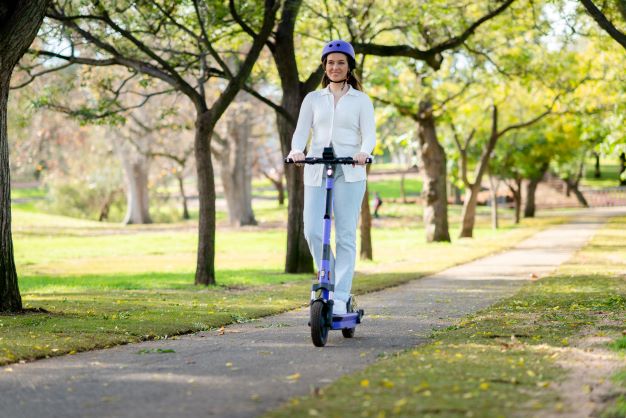
 visit raa.com.au
visit raa.com.au
Emily Perry – RAA General Manager Community & Corporate Affairs
E-scooters aren’t the enemy, they’re an enabler.
They enable better access to public transport, better connectivity in the CBD and other precincts – and they are a better, cleaner transport solution than cars in many cases.
Last week’s Pedestrian Council opinion piece showed they are fierce advocates for pedestrians – and they do some great work – but at RAA we represent more than 820,000 members who come from all walks of life (pardon the pun).
Our members drive, catch public transport, cycle, walk – and more and more of them are choosing to use e-scooters for shorter journeys.
In fact, since 2020 more than 3 million e-scooter trips have been taken across Adelaide as part of the current trial – so people are voting with their feet.

I use the public e-scooters myself to get to and from meetings in the city, or when I drop my car off to be serviced. Somewhat tragically, these short trips in the sunshine bring me a lot of joy!
RAA believes e-scooters form part of South Australia’s transport future – as they do in hundreds of cities around the world.
Allowing private e-scooters will give more people, more options when it comes to their daily commute.
E-scooters can unlock public transport for those who live more than a few hundred metres from their nearest bus stop or train station – meaning they don’t need to own a car purely to access public transport.
This could save them thousands of dollars in transport costs each year, ease congestion on our roads and is better for the environment.
Anyone who drives through Adelaide during peak hour knows we need to be doing everything we can to encourage other modes of transport.
We don’t want to become like Melbourne and Sydney, where grid-locked roads make you shudder at the thought of getting in your car.
Now no one is suggesting e-scooters should be allowed to fly down the footpath at 100km/hr, or that any safety concerns should be ignored.

To suggest that is simply unproductive fear mongering.
Like everything, we’ll need the right legislative framework in place to ensure they are used safely in the community.
The big issue that does need to be addressed is public liability insurance.
In RAA’s submission to the State Government’s e-scooter consultation, we recommended that, in the absence of a permanent form of insurance cover, the State Government should cover anyone injured in an e-scooter incident using a scheme like the Lifetime Support Authority.
Other states that have allowed public e-scooters have not addressed this issue, instead relying on civil action through courts.
There are certainly some finer details to work through, but the state government has undertaken a long and thorough consultation following extensive trials around Adelaide.
Based on that consultation and strong support, they’ve now given e-scooters the green light.
Again, the Government will be consulting on the regulations to enable e-scooters and RAA will work constructively with Government about getting the details right.
Pedestrians already co-exist on footpaths with bicycles, public e-scooters and mobility scooters in Adelaide.
In most places there is more than enough room, and e-scooter riders behave responsibly.
E-scooters and other e-rideables are here to stay.
To completely ban them would be shortsighted, and only further entrench South Australia’s reliance on personal cars.